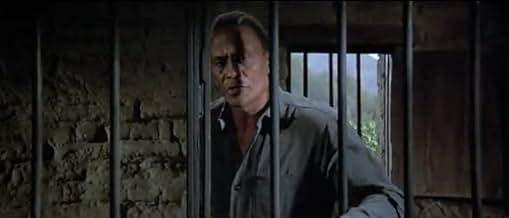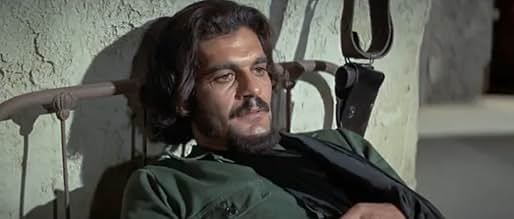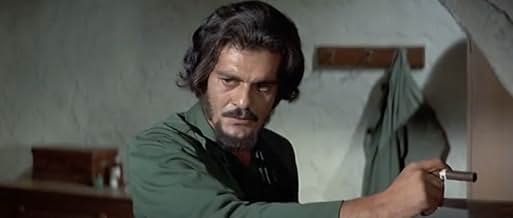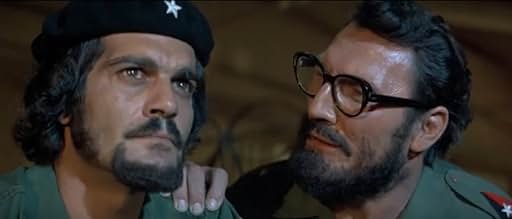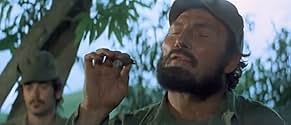AVALIAÇÃO DA IMDb
4,8/10
1,1 mil
SUA AVALIAÇÃO
Adicionar um enredo no seu idiomaAn intentionally noncommittal version of the Cuban revolution told through flashbacks, the film recounts Che's switch from doctor to politico in Castro's campaign.An intentionally noncommittal version of the Cuban revolution told through flashbacks, the film recounts Che's switch from doctor to politico in Castro's campaign.An intentionally noncommittal version of the Cuban revolution told through flashbacks, the film recounts Che's switch from doctor to politico in Castro's campaign.
- Direção
- Roteiristas
- Artistas
BarBara Luna
- Anita Marquez
- (as Barbara Luna)
Avaliações em destaque
I saw this picture many years ago at its premiere and I never had a chance to see it again, but I would like to say something about it. First of all, Richard Fleischer is a distinguished director. See, for instance, "The Vikings", maybe the best adventure movie ever, or "Compulsion", a thrilling and alluring criminal drama. The problem with "Che!" is that it deals with too many facts and subjects in the while of 80 or 90 minutes. A lot of things are kept off-screen. Besides,the actors are completely unsuitable and the screenplay is poor. Characters and History itself is unfold in a distorted manner; so that, people who know a bit about Cuban Revolution fall disappointed. The movie grows better in the second half when Che tries to lead a guerrilla party in Bolivia. I still remember the last sequence showing a bedraggled and crippled Guevara, minutes before his decease, sitting on the floor of a schoolroom. A Bolivian Army officer calls in a village goat-herder , points towards wretched Guevara and asks the peasant : "Can't you see ? he has come here to free you!" The herder seems astonished, stares at the two men for a while and utters at last :"To free me ??? Since these people have shown up, shooting haphazardly, the goats have grown frightened , their milk dried and we have nothing to feed our children! So ... is this to free us ?" Next, Guevara raises and walks lamely towards the wall outside the door. Before him a firing squad is waiting. I don't know why, but I always fancy Guevara's last stand as depicted in this ill-fated flick.
How could this movie work as a factual representation or artistic vision?
1) it comes at the height of an anti-Castro obsession this country had and in many ways, still does (see, the US liked the harshly oppressive Cuban Government that preceded Castro, because we were allowed to profit from it's fascism). The very tagline of the movie shows one of it's main objectives - to paint Castro or at least his economic model as cartoonish villainy.
2) The Hollywood of the time not wanting to go to the risk of having actual Cubans or even people of closely related nationalities in the leading roles, we have very American leading men doing laughable Cuban impressions. Jack Palance as Fidel Castro? Thankfully this tradition has broken so we never saw Nicholas Cage as Malcom X.
3) Facts are of no concern to the filmmakers.
It does, however, have my recommendation - as a spectacle (it is an interesting one), but hardly as a decent piece of cinema.
1) it comes at the height of an anti-Castro obsession this country had and in many ways, still does (see, the US liked the harshly oppressive Cuban Government that preceded Castro, because we were allowed to profit from it's fascism). The very tagline of the movie shows one of it's main objectives - to paint Castro or at least his economic model as cartoonish villainy.
2) The Hollywood of the time not wanting to go to the risk of having actual Cubans or even people of closely related nationalities in the leading roles, we have very American leading men doing laughable Cuban impressions. Jack Palance as Fidel Castro? Thankfully this tradition has broken so we never saw Nicholas Cage as Malcom X.
3) Facts are of no concern to the filmmakers.
It does, however, have my recommendation - as a spectacle (it is an interesting one), but hardly as a decent piece of cinema.
Superficial biographical flick about international revolutionary and Castro's second in command Che Guevara, Omar Sharif. The movie gives you the impression that if it wasn't for Che Fidel Castro, Jack Palance, would never have taken over Cuba in what's called the Great Peasant Revolution of 1959. Che, an Argentinian doctor and one-world revolutionary, did in fact land with Castro and his contingent of 82 men off the west coast of Cuba on December 2, 1956.
After being ambushed by Batista's, the Cuban dictator, men only a dozen, including Che & Castro, survived. During the next two years in the Sierra Maestras mountains the dozen revolutionaries grew into the thousands. It was undoubtedly because of the leadership and knowledge of guerrilla tactics and warfare by Che that forced the besieged and defeated Batista to abandon his palace in Havana on New Years Eve 1959 and check out of the country. This left a victorious Castro & Co. to enter the capital city without as much as a shot being fired on New Years Day.
The movie shows how Che became a ruthless and blood-thirsty disciplinarian to the troops. Che as a command-ante is shown without as much as flinching ordering the execution of traitors, many times in the movie doing it himself, that even his leader Fidel didn't have the heart to do. After the Castro take-over of Cuba Che held around the clock military trials and executions of former Batista political and military personal. This even shocked and outraged some of the most battle-hardened Cuban revolutionaries. Che's excuse for his cold-blooded policies was that if he didn't show the people that he was ridding the country of Bitista's war criminals they would do the job for him themselves. This would result in many innocent, far more then those proved guilty by his military tribunals, people ending up being slaughtered by rampaging mindless and vengeful mobs.
The movie "Che" goes on to show that it was Che who gave Fidel Castro the idea of not only declaring himself a Marxist which outraged the United States Government and turned it against him but in establishing diplomatic and military relations with the Soviet Union. This lead to the 1961 fiasco, for the US and Free Cubans, known as "the Bay of Pigs". Were also show that it was Che who planted the idea in Fidel's head to invite the Soviet Union to use Cuba as a base for it's nuclear missiles. This irresponsible action, on Castro and the USSR's part, almost brought the world to the brink of nuclear war in the autumn of 1962.
Feeling betrayed by his friend Fidel and his Soviet allies for backing down to the US during the Cuban Missile Crisis Che, calling Castro a Soviet dupe, decided to leave the safety of Cuba and go out in the dangerous hills and valleys of Bolivia to start a revolution of his own. Since in reality Che left for Bolivia in late 1966 or early 1967 the event, in the movie, of Che's break with Castro,in 1962, seems a bit premature.
In Bolivia Che lost his revolutionary persona as well as his ability to rally peasants, like he did in Cuba ten years earlier, to his aid. Going against his own writings and principles about how a guerrilla/revolutionary war should be fought had Che's men, mostly Bolivian rebels, desert him because of his mindless and brutal tactics to whip up both support and recruits among the peasant population.
The hard life as a guerrilla fighter coupled with his deteriorating asthmatic condition, smoking Cuban cigars didn't help Che's asthma either, took a heavy toll on Che's health. Fate eventually caught up with Che as well as the Bolivian army and on October 9, 1967 in an ambush at the Quebrada del Yuro ravine the life-long revolutionary was shot and captured. Later, on orders from the Bolivian high command, Che was executed as if he were just a common criminal not the man who's name became synonymous with world as well as local revolution over the last thirty five years.
More of a curiosity piece then anything else "Che" has it's share of unintentional laughs. Omar Sharif in many of the battle and strenuous jungle mountain climbing scenes in the movie is heard breathing and wheezing, because of his asthma condition, like someone making an obscene phone-call. The final scene when Che's confronted by an elderly Bolivian peasant berating him about how his guerrilla actions in and around his village have caused his goats to cease from giving milk. The scene looks like something straight out of a Mystery Science 3000 parody of an unintentionally and hilariously funny movie.
Jack Palance as Fidel Castro with his fake plastic nose and acting as if he'd be lost without Che makes the guy, Castro, look like a totally helpless dolt as well as alcoholic buffoon. Castro who seems to drink as many bottles of booze as the cigars that he smokes that it's a wonder that he's still around now; some forty after Che left him to run Cuba on his own!
At the time of the movies release in the spring of 1969 there were plans by many Cuban/Americans to demonstrate in front of the movie-houses that were to be playing "Che". It wasn't until after word of mouth, as well as critics reviews, about how awful the film really was that it was decided that "Che" instead of ingratiating Castro's Cuba was in fact the United States revenge for it's defeat by Castro's army and militia at "the Bay of Pigs"!
After being ambushed by Batista's, the Cuban dictator, men only a dozen, including Che & Castro, survived. During the next two years in the Sierra Maestras mountains the dozen revolutionaries grew into the thousands. It was undoubtedly because of the leadership and knowledge of guerrilla tactics and warfare by Che that forced the besieged and defeated Batista to abandon his palace in Havana on New Years Eve 1959 and check out of the country. This left a victorious Castro & Co. to enter the capital city without as much as a shot being fired on New Years Day.
The movie shows how Che became a ruthless and blood-thirsty disciplinarian to the troops. Che as a command-ante is shown without as much as flinching ordering the execution of traitors, many times in the movie doing it himself, that even his leader Fidel didn't have the heart to do. After the Castro take-over of Cuba Che held around the clock military trials and executions of former Batista political and military personal. This even shocked and outraged some of the most battle-hardened Cuban revolutionaries. Che's excuse for his cold-blooded policies was that if he didn't show the people that he was ridding the country of Bitista's war criminals they would do the job for him themselves. This would result in many innocent, far more then those proved guilty by his military tribunals, people ending up being slaughtered by rampaging mindless and vengeful mobs.
The movie "Che" goes on to show that it was Che who gave Fidel Castro the idea of not only declaring himself a Marxist which outraged the United States Government and turned it against him but in establishing diplomatic and military relations with the Soviet Union. This lead to the 1961 fiasco, for the US and Free Cubans, known as "the Bay of Pigs". Were also show that it was Che who planted the idea in Fidel's head to invite the Soviet Union to use Cuba as a base for it's nuclear missiles. This irresponsible action, on Castro and the USSR's part, almost brought the world to the brink of nuclear war in the autumn of 1962.
Feeling betrayed by his friend Fidel and his Soviet allies for backing down to the US during the Cuban Missile Crisis Che, calling Castro a Soviet dupe, decided to leave the safety of Cuba and go out in the dangerous hills and valleys of Bolivia to start a revolution of his own. Since in reality Che left for Bolivia in late 1966 or early 1967 the event, in the movie, of Che's break with Castro,in 1962, seems a bit premature.
In Bolivia Che lost his revolutionary persona as well as his ability to rally peasants, like he did in Cuba ten years earlier, to his aid. Going against his own writings and principles about how a guerrilla/revolutionary war should be fought had Che's men, mostly Bolivian rebels, desert him because of his mindless and brutal tactics to whip up both support and recruits among the peasant population.
The hard life as a guerrilla fighter coupled with his deteriorating asthmatic condition, smoking Cuban cigars didn't help Che's asthma either, took a heavy toll on Che's health. Fate eventually caught up with Che as well as the Bolivian army and on October 9, 1967 in an ambush at the Quebrada del Yuro ravine the life-long revolutionary was shot and captured. Later, on orders from the Bolivian high command, Che was executed as if he were just a common criminal not the man who's name became synonymous with world as well as local revolution over the last thirty five years.
More of a curiosity piece then anything else "Che" has it's share of unintentional laughs. Omar Sharif in many of the battle and strenuous jungle mountain climbing scenes in the movie is heard breathing and wheezing, because of his asthma condition, like someone making an obscene phone-call. The final scene when Che's confronted by an elderly Bolivian peasant berating him about how his guerrilla actions in and around his village have caused his goats to cease from giving milk. The scene looks like something straight out of a Mystery Science 3000 parody of an unintentionally and hilariously funny movie.
Jack Palance as Fidel Castro with his fake plastic nose and acting as if he'd be lost without Che makes the guy, Castro, look like a totally helpless dolt as well as alcoholic buffoon. Castro who seems to drink as many bottles of booze as the cigars that he smokes that it's a wonder that he's still around now; some forty after Che left him to run Cuba on his own!
At the time of the movies release in the spring of 1969 there were plans by many Cuban/Americans to demonstrate in front of the movie-houses that were to be playing "Che". It wasn't until after word of mouth, as well as critics reviews, about how awful the film really was that it was decided that "Che" instead of ingratiating Castro's Cuba was in fact the United States revenge for it's defeat by Castro's army and militia at "the Bay of Pigs"!
If you are determined to see CHE! no matter what, I highly suggest you first pick up and read a good book about the man, Fidel Castro, and the Cuban revolution itself. Otherwise, you'll be utterly confused. The movie starts with the rebel invasion of Cuba, without giving us any idea about what Che had been doing up to that point of time. (Like: Why was he convinced to follow Castro?) We also don't really see what the political situation was exactly like in Cuba at the time. (How can we understand the rebels if we don't know what they are fighting against?) The movie continues to be confusing by subsequently not making it clear just how the rebels were able to build in force after being almost completely wiped out... or just how exactly they were able to weaken the government forces... or how Che transformed from a weakling into a strong leader (it seems to happen overnight!)... or why exactly Che got tired of being in Cuba.
The subsequent unfolding events do get somewhat clearer once Che gets to Bolivia and starts his doomed campaign there, but you still don't understand the man. And with Richard Fleischer at the helm - a director who was usually only as good as his script - the movie sinks deeper into badness. The fact that Fleischer shows a complete inablility to film action scenes is just the least of his problems.
And talk about miscasting! Omar Sharif as Che?!? He looks understandably confused and cowed in the role - deadly for someone who was reportedly a charismatic and cunning leader. But his performance is brilliant next to that of Jack Palance. Palance is unbelievably goofy as Castro, who was a strong leader in his own right. Reports at the time of filming state that Palance asked that Castro's "buffoonery" in the script be changed. Apparently that didn't happen. I can imagine that Palance subsequently decided to take revenge by hamming things up, especially since he also stated to the press after filming that he regretted ever being involved in this production.
The subsequent unfolding events do get somewhat clearer once Che gets to Bolivia and starts his doomed campaign there, but you still don't understand the man. And with Richard Fleischer at the helm - a director who was usually only as good as his script - the movie sinks deeper into badness. The fact that Fleischer shows a complete inablility to film action scenes is just the least of his problems.
And talk about miscasting! Omar Sharif as Che?!? He looks understandably confused and cowed in the role - deadly for someone who was reportedly a charismatic and cunning leader. But his performance is brilliant next to that of Jack Palance. Palance is unbelievably goofy as Castro, who was a strong leader in his own right. Reports at the time of filming state that Palance asked that Castro's "buffoonery" in the script be changed. Apparently that didn't happen. I can imagine that Palance subsequently decided to take revenge by hamming things up, especially since he also stated to the press after filming that he regretted ever being involved in this production.
With more than it's fair share of wooden acting 'Che!' seems doomed from the word go.
Omar Shariff attempts to breathe life into his overtly asthmatic portrayal of the revolutionary icon, Ernesto Che Guevaro, but is held back by the sheer lack of factual references. Jack Palance portrays Fidel Castro, in a manner that could almost have been written by the US government, as a man not able to fully think things through for himself. The film portrays the July 26th movement as an inept band of unwashed desperados who want to take over Cuba, but with only sheer luck, & government ineptitude, helping them to ultimately win through.
Covering the period of time from Che's first arrival on Cuban soil in 1956 until his Bolivian death in 1967, 'Che!' struggles with both poor screenplay and locations, but still trys to maintain a sense of purpose throughout. It could have been so much better. The political oppression that led to the overthrow of the Batista regime is totally glossed over & the rebels life, in the Sierra Madre, is portrayed as almost luxurious with Batista's troops wandering around waiting to be shot. Constant monologues, as a means to link scenes, prove to be more irritating than useful, and you find yourself wishing for the what little action there is to resume.
The film truly dies when Guevara leaves Cuba for Bolivia, with Shariff becoming more asthmatic and psychotic by the minute, until his ultimate capture in the mountains and his eventual murder in the backroom of La Higuera's village schoolhouse.
Any half decent film director would probably relish the chance to make a bio-pic of the legend that is Che Guevara. Che is an icon who deserves to have a film biography worthy of his legend, in the same manner of the bio-pics of Chaplin, Gandhi, Biko, Morrison etc.
Omar Shariff attempts to breathe life into his overtly asthmatic portrayal of the revolutionary icon, Ernesto Che Guevaro, but is held back by the sheer lack of factual references. Jack Palance portrays Fidel Castro, in a manner that could almost have been written by the US government, as a man not able to fully think things through for himself. The film portrays the July 26th movement as an inept band of unwashed desperados who want to take over Cuba, but with only sheer luck, & government ineptitude, helping them to ultimately win through.
Covering the period of time from Che's first arrival on Cuban soil in 1956 until his Bolivian death in 1967, 'Che!' struggles with both poor screenplay and locations, but still trys to maintain a sense of purpose throughout. It could have been so much better. The political oppression that led to the overthrow of the Batista regime is totally glossed over & the rebels life, in the Sierra Madre, is portrayed as almost luxurious with Batista's troops wandering around waiting to be shot. Constant monologues, as a means to link scenes, prove to be more irritating than useful, and you find yourself wishing for the what little action there is to resume.
The film truly dies when Guevara leaves Cuba for Bolivia, with Shariff becoming more asthmatic and psychotic by the minute, until his ultimate capture in the mountains and his eventual murder in the backroom of La Higuera's village schoolhouse.
Any half decent film director would probably relish the chance to make a bio-pic of the legend that is Che Guevara. Che is an icon who deserves to have a film biography worthy of his legend, in the same manner of the bio-pics of Chaplin, Gandhi, Biko, Morrison etc.
Você sabia?
- CuriosidadesThe film was seen as so offensive in Chile and Argentina that Molotov cocktails were reportedly thrown at the screen in some cinemas.
- Erros de gravaçãoWhen Anita Márquez filled Che's mate bowl, he passed it to her without the bombilla, the metal straw; he then stirred the mate and took a drink. It's not done that way: the bombilla stays in the leaves at all times (no stirring).
- Citações
Fidel Castro: Sometimes, Che, I just don't understand you!
- ConexõesFeatured in Experiência Americana: Guerrilla: The Taking of Patty Hearst (2004)
Principais escolhas
Faça login para avaliar e ver a lista de recomendações personalizadas
- How long is Che!?Fornecido pela Alexa
Detalhes
Bilheteria
- Orçamento
- US$ 2.800.000 (estimativa)
- Tempo de duração1 hora 36 minutos
- Cor
- Proporção
- 2.35 : 1
Contribua para esta página
Sugerir uma alteração ou adicionar conteúdo ausente

Principal brecha
By what name was Causa Perdida (1969) officially released in India in English?
Responda
